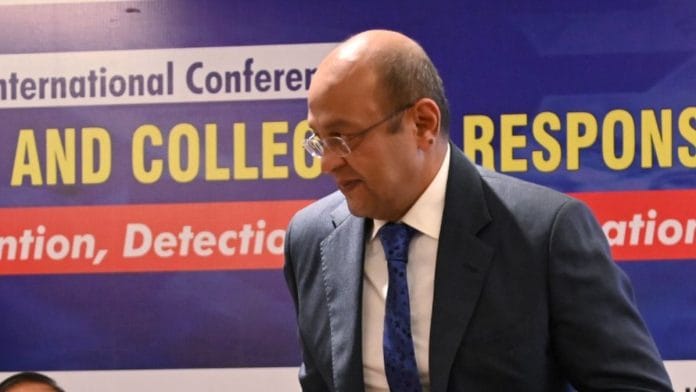New Delhi: The Supreme Court collegium led by Chief Justice Sanjiv Khanna Thursday recommended the transfer of Delhi High Court judge Justice Yashwant Varma following a complaint about cash being found at his residence.
Justice Varma is likely to be repatriated to his parent High Court, Allahabad, from where he was moved to Delhi in 2021, ThePrint has learnt, and may also be asked to resign later.
Though a formal decision has been taken on the transfer, the resolution on the same is yet to be uploaded on the Supreme Court website, as is the practice.
According to sources in the Supreme Court, cash was found at the outhouse of the judge’s official bungalow last week by a team of firefighters who were called to put out a fire that broke out there. Justice Varma was not in town when the incident happened and the fire brigade was called by his family members. His 82-year-old mother and daughter were at home.
After the fire was brought under control, the official team of fire brigade and police that was present at the site found cash, some of it damaged, leading to official entries in the record.
Details of the unaccounted cash were provided to CJI Khanna who immediately convened the collegium that deals with transfer of high court judges.
Sources said that government functionaries had handed out a video recording of the unaccounted money found at the judge’s residence to the CJI. Though Justice Khanna did not show the video clip to other collegium members, he explained the content to them, they said.
Besides the CJI, apex court judges following him in seniority are members of this panel. At present, Justices B.R. Gavai, Surya Kant, Abhay S. Oka and Vikram Nath are members of the collegium.
Unanimously, the collegium members agreed to move Justice Varma out of Delhi. According to the decision taken, which is yet to be made public through a resolution, the judge is likely to go back to his parent high court where he was appointed as judge on 13 October, 2014.
There is another view in the collegium, however. Keeping in mind the gravity of the issue, the members feel that letting Justice Varma off with a transfer would not send a proper signal and something more needs to be done.
Therefore, Justice Varma may be asked to resign, sources told ThePrint.
“This is the prerogative of the CJI who has called for a report from the Delhi High Court Chief Justice on the incident. After going through the report, the CJI will take a call on the next step,” a source said, adding the CJI is vested with the power to take a further course of action under the in-house procedure.
Since the issue of transfer does not require any report, the collegium found it fit to proceed with it, the sources added.
In case the CJI asks for Justice Varma’s resignation and the latter refuses, then an in-house inquiry, which is the first step towards his removal by Parliament, can be initiated.
The in-house inquiry procedure, set out in 1999, is a mechanism designed to address complaints of corruption, wrongdoing or impropriety against a sitting high court or Supreme Court judge.
Under this, an opportunity is given to the judge to respond to the allegations. In case the CJI feels that a deeper probe is needed, he/she can constitute a probe panel comprising Supreme Court and high court judges who then hold a proper hearing of the complaint, during which the complainant is also examined.
(Edited by Nida Fatima Siddiqui)
Also Read: SC wants a relook at its own 2017 judgement on process of designating senior advocates






